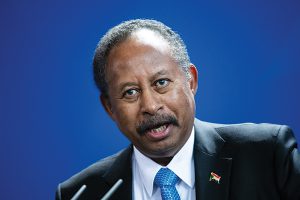Bloomberg
Sudanese Prime Minister Abdalla Hamdok resigned, saying that attempts to share power between the military and civilians had failed as deadly protests continued to rage against October’s coup.
Without nationwide consensus on the way forward, the North African country risks sliding into chaos, Hamdok said in a televised address. His resignation, which had been expected for more than a week, leaves Sudan’s transitional government almost entirely in the hands of the military.
A former United Nations economist, Hamdok was chosen as premier after the 2019 overthrow of Omar al-Bashir, in a power-sharing deal that was supposed to eventually lead to democratic elections.
Relations with the army, the guiding force for much of Sudan’s six decades of independence, were fraught and culminated in the arrest of Hamdok and members of his cabinet in late October.
Hamdok was reinstated as prime minister a month later in a pact rejected by activists who’ve kept up protests demanding the army surrender complete power to civilians. At least two protesters were shot dead Sunday in Omdurman, the twin city of the capital, Khartoum, in the latest demonstrations, according to a local doctors’ committee.
Hamdok’s August 2019 acceptance of the premiership was on the basis of “political consensus between the civilian and military components, which I preached as a unique Sudanese model,†he said. “But it did not survive with the same degree of commitment and harmony with which it began.â€
“To our armed forces – the army, rapid support forces, police, and intelligence services – and all the regular security agencies, I say: The people are the final sovereign authority,†Hamdok said.
 The Gulf Time Newspaper One of the finest business newspapers in the UAE brought to you by our professional writers and editors.
The Gulf Time Newspaper One of the finest business newspapers in the UAE brought to you by our professional writers and editors.
